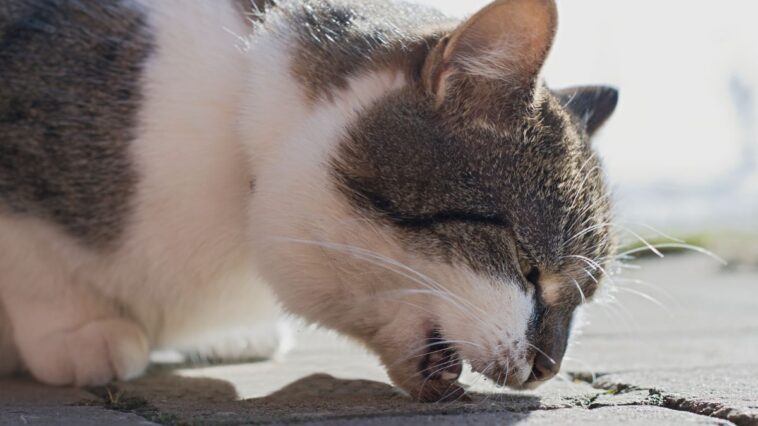Cat vomiting can be a cause of concern for many cat owners. While occasional vomiting can be normal for cats, frequent and persistent vomiting can indicate underlying health issues. Understanding the causes, symptoms, and prevention of cat vomiting is essential to help manage and maintain your feline’s health.
This post will explore various aspects of cat vomiting, including the common causes, symptoms, preventive measures, home remedies, veterinary treatment options, and when to seek veterinary care. Whether you are a new cat owner or an experienced one, this post will provide you with valuable insights and practical solutions to manage and address cat vomiting effectively.
Causes of Cat Vomiting
Cat vomiting can be caused by various factors, some of which are harmless, while others can indicate a more serious health condition. Here are some common triggers of cat vomiting:
Hairballs: Cats groom themselves by licking their fur, which can lead to hair ingestion. Over time, the hair can accumulate in the stomach, forming a hairball. When the hairball becomes too large, the cat may vomit to expel it.
Dietary Issues: Cats may vomit if they eat too much or too quickly or are fed spoiled or contaminated food. Additionally, some cats may have food intolerances or allergies that can cause vomiting.
Ingesting Non-Food Items: Cats are curious creatures, and they may ingest non-food items like plants, plastic, or string. These foreign objects can irritate the stomach lining and cause vomiting.
Gastrointestinal Issues: Some cats may suffer from gastrointestinal problems such as inflammatory bowel disease (IBD), gastroenteritis, or pancreatitis. These conditions can cause vomiting and other symptoms like diarrhea and weight loss.
Parasites and Infections: Parasites like roundworms, tapeworms, and giardia can cause vomiting in cats. Infections like feline distemper (panleukopenia) and feline leukemia virus (FeLV) can also cause vomiting.
Poisoning: Cats may accidentally ingest toxic substances like household cleaners, medications, and certain plants. These substances can cause vomiting and other symptoms like diarrhea, seizures, and lethargy.
It’s important to note that occasional vomiting in cats is normal and may not be a cause for concern. However, if your cat is vomiting frequently or if you notice any other signs of illness, it’s best to seek veterinary care to determine the underlying cause and receive appropriate treatment.
Cat Vomiting Symptoms
Recognizing the signs and symptoms of cat vomiting is crucial in understanding your cat’s health. Here are some details about the common symptoms associated with cat vomiting:
Retching: Retching is a strong, repetitive, and involuntary contraction of the abdominal muscles. It often precedes the actual vomiting and can be a sign that your cat is about to vomit. You may notice your cat making retching sounds or movements as if trying to expel something from its stomach.
Regurgitation: Regurgitation is different from vomiting. It involves the passive expulsion of undigested food or liquid from the esophagus without the forceful abdominal contractions seen in vomiting. If your cat regurgitates, you may find undigested food or a slimy mass on the floor, often shaped like a tube.
Changes in Appetite: Vomiting can lead to a loss of appetite in cats. If your cat suddenly shows a decreased interest in food or starts eating less, it may be a sign of an underlying issue. On the other hand, some cats may experience an increased appetite after vomiting due to an empty stomach.
Changes in Behavior: Cats feeling unwell due to vomiting may exhibit changes in their behavior. They may become more lethargic, withdrawn, or display signs of discomfort. Some cats may also show signs of distress, restlessness, or anxiety.
Dehydration: Frequent vomiting can cause dehydration in cats. Watch out for signs such as dry or sticky gums, loss of skin elasticity, decreased urine output, or sunken eyes. Dehydration can be serious and requires prompt veterinary attention.
Other accompanying symptoms: Pay attention to additional signs accompanying vomiting, as they can provide important clues about the underlying cause. These may include diarrhea, weight loss, bloating, blood in the vomit, changes in litter box habits, or foreign objects in the vomit.
Remember that occasional, isolated vomiting incidents may not be cause for immediate concern. However, if your cat is vomiting frequently, the vomit contains blood, or your cat shows other signs of illness or distress, it is important to consult a veterinarian for a proper diagnosis and appropriate treatment.
Preventing Cat Vomiting
Preventing cat vomiting can involve a combination of measures, including proper diet, feeding techniques, and environmental considerations. Here are some effective strategies and preventive measures to reduce the occurrence of cat vomiting:
Proper Diet: Feeding your cat a high-quality, balanced diet can help prevent vomiting due to dietary issues. Avoid giving your cat too many treats or table scraps, as they can upset the stomach. Also, ensure that your cat can always access fresh water.
Feeding Techniques: Feeding techniques can also play a role in preventing cat vomiting. Try feeding smaller, more frequent meals throughout the day instead of large, infrequent ones. Additionally, feeding your cat on a raised platform can help reduce the incidence of hairballs.
Environmental Considerations: Cats are sensitive to environmental changes, and stress can contribute to vomiting. Ensure your cat has a safe, quiet, and comfortable place to rest and play. Also, keep your cat’s litter box clean and quiet to reduce stress and anxiety.
Hairball Prevention: Hairballs are a common cause of vomiting in cats. To prevent hairballs, brush your cat regularly to remove loose hair. Consider adding a hairball prevention supplement or treat to your cat’s diet.
Parasite Control: Parasites like roundworms and tapeworms can cause vomiting in cats. Ensure your cat is up-to-date on all parasite prevention medication, and consider deworming your cat regularly.
Regular Veterinary Check-Ups: Regular veterinary check-ups can help identify and address potential health issues before they become serious. Your veterinarian can guide appropriate nutrition, feeding techniques, and other preventive measures to keep your cat healthy and happy.
By implementing these strategies and preventive measures, you can help reduce the incidence of cat vomiting and keep your feline friend healthy and comfortable. However, if your cat is vomiting frequently or showing signs of illness, it is important to seek veterinary attention to determine the underlying cause and receive appropriate treatment.
Home Remedies for Cat Vomiting
While home remedies can help alleviate occasional bouts of cat vomiting, it is important to note that they should not replace veterinary care, especially if vomiting persists or is accompanied by other concerning symptoms. Here are some natural remedies and at-home treatments that may provide relief:
Hairball Remedies: Hairballs are a common cause of vomiting in cats. You can help reduce the frequency of hairballs by regularly grooming your cat to remove loose hair. Additionally, hairball remedies are available in the form of treats, gels, or pastes that help lubricate the digestive tract and aid in the passage of hair.
Dietary Adjustments: In some cases, dietary changes can help alleviate vomiting in cats. Consult your veterinarian for specific dietary recommendations based on your cat’s needs. If you suspect your cat’s diet is causing the issue, consider transitioning to high-quality, easily digestible cat food.
Ginger-Based Solutions: Ginger has anti-inflammatory properties and can help soothe the stomach. You can give your cat small amounts of ginger by mixing a tiny pinch of powdered ginger into their food or offering ginger-infused water. However, always consult your veterinarian before introducing any new herb or remedy to your cat’s diet.
Feeding in Smaller Portions: Instead of feeding your cat larger meals, try dividing the daily portion into smaller, more frequent meals. This can help prevent overeating, reduce the chances of indigestion, and minimize the risk of vomiting.
Hydration: Ensure your cat stays well-hydrated, as dehydration can contribute to digestive issues. Always provide fresh water and consider adding additional water sources, such as a cat water fountain, to encourage drinking.
Stress Reduction: Stress and anxiety can contribute to vomiting in cats. Create a calm and comfortable environment for your cat, providing hiding spots, quiet areas, and vertical spaces. Engage in interactive play sessions and provide mental stimulation to help alleviate stress.
It’s important to note that these home remedies are intended for occasional vomiting and should not be used as a substitute for professional veterinary care. If your cat’s vomiting persists, worsens, or is accompanied by other concerning symptoms, it is crucial to consult with a veterinarian to identify and address the underlying cause.
Treating Cat Vomiting
When treating cat vomiting, veterinary care is essential for diagnosing and addressing the underlying causes. Here are some common veterinary treatment options that may be employed:
Medical Examination: A thorough physical examination by a veterinarian is often the first step in diagnosing the cause of cat vomiting. The vet will assess the cat’s overall health, check for signs of dehydration, palpate the abdomen, and may perform additional tests or procedures based on their findings.
Diagnostic Testing: Diagnostic tests can help identify the underlying cause of vomiting. These may include blood tests, fecal analysis, urinalysis, X-rays, ultrasound, or specialized tests such as endoscopy or biopsies. These tests can provide insights into potential infections, organ dysfunction, gastrointestinal disorders, or other underlying conditions.
Medications: Depending on the diagnosis, your veterinarian may prescribe medications to address the underlying cause of vomiting. For example, if the cause is gastritis or gastrointestinal inflammation, medications such as anti-emetics (to control vomiting) or anti-inflammatory drugs may be prescribed. In cases of bacterial or parasitic infections, appropriate antibiotics or antiparasitic medications may be necessary.
Dietary Changes: In some cases, dietary modifications can help manage vomiting. Your veterinarian may recommend switching to a hypoallergenic or easily digestible diet or a prescription diet specifically formulated for gastrointestinal health. These diets can help address food sensitivities, allergies, or digestive disorders.
Fluid Therapy: If your cat is dehydrated due to vomiting, the veterinarian may administer fluids orally or intravenously to rehydrate them and restore the body’s electrolyte balance.
Treatment of Underlying Conditions: If vomiting is a symptom of an underlying health condition, such as inflammatory bowel disease (IBD), pancreatitis, or kidney disease, your veterinarian will develop a treatment plan specific to that condition. This may involve a combination of medication, dietary changes, and ongoing management to control symptoms and improve the cat’s overall health.
It is crucial to work closely with your veterinarian to determine the most appropriate treatment plan for your cat’s specific situation. They will consider the underlying cause, the cat’s overall health, and other factors to develop an individualized approach to managing and resolving the vomiting issue.
When to Seek Veterinary Care for Cat Vomiting
Knowing when to seek veterinary care for cat vomiting is essential to ensure the health and well-being of your feline companion. Here are some situations in which it is important to consult a veterinarian:
Persistent or Severe Vomiting: If your cat is vomiting frequently, repeatedly, or for an extended period, it is a cause for concern. Vomiting that persists for more than 24 hours or occurs multiple times within a few hours should prompt a veterinary visit.
Presence of Blood or Foreign Objects: If you notice blood in your cat’s vomit or if they have ingested a foreign object that could be causing the vomiting, it is important to seek immediate veterinary care. Blood in vomit can be a sign of gastrointestinal bleeding, while foreign objects can cause obstructions or damage to the digestive tract.
Lethargy or Weakness: If your cat is vomiting and also appears lethargic, weak, or listless, it could be an indication of a more serious underlying condition. These symptoms may suggest dehydration, electrolyte imbalances, or systemic illness and require veterinary attention.
Weight Loss: Unexplained weight loss accompanied by vomiting is a cause for concern. It could indicate a chronic condition, such as kidney disease, hyperthyroidism, or cancer. A veterinarian can evaluate your cat’s overall health and determine the appropriate action.
Other Symptoms or Changes in Behavior: If your cat exhibits additional symptoms such as diarrhea, fever, abdominal pain, excessive drooling, difficulty breathing, or changes in behavior, it is important to consult a veterinarian. These signs could indicate an underlying illness or a more serious condition requiring medical intervention.
Remember, occasional and isolated vomiting incidents may not be cause for immediate concern. However, if the vomiting becomes frequent and severe or is accompanied by any concerning symptoms, it is best to avoid caution and seek veterinary care. Your veterinarian can perform a thorough examination, conduct diagnostic tests, and provide appropriate treatment based on the underlying cause of the vomiting.




